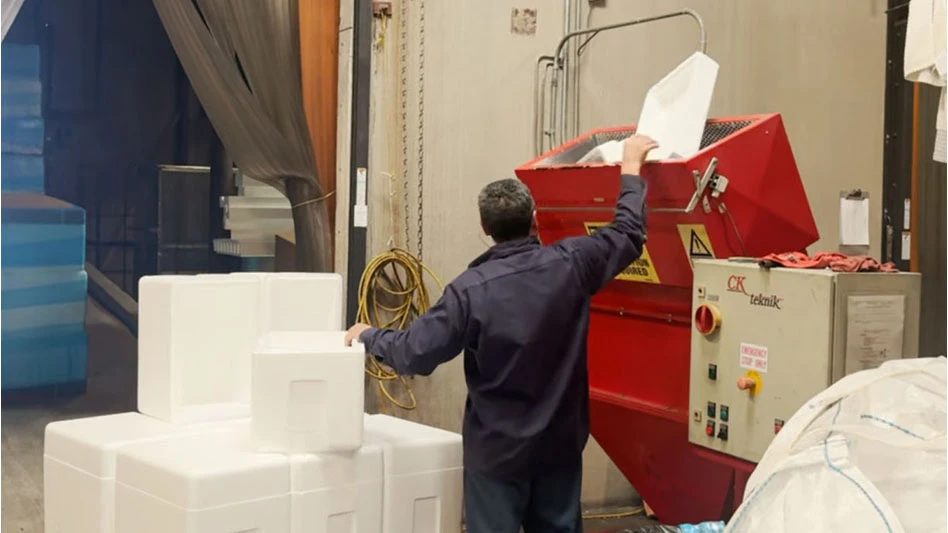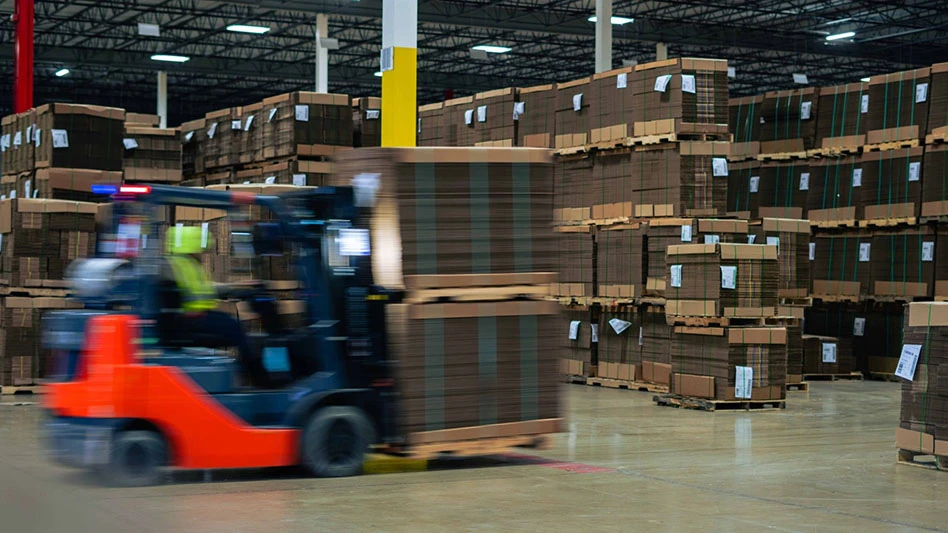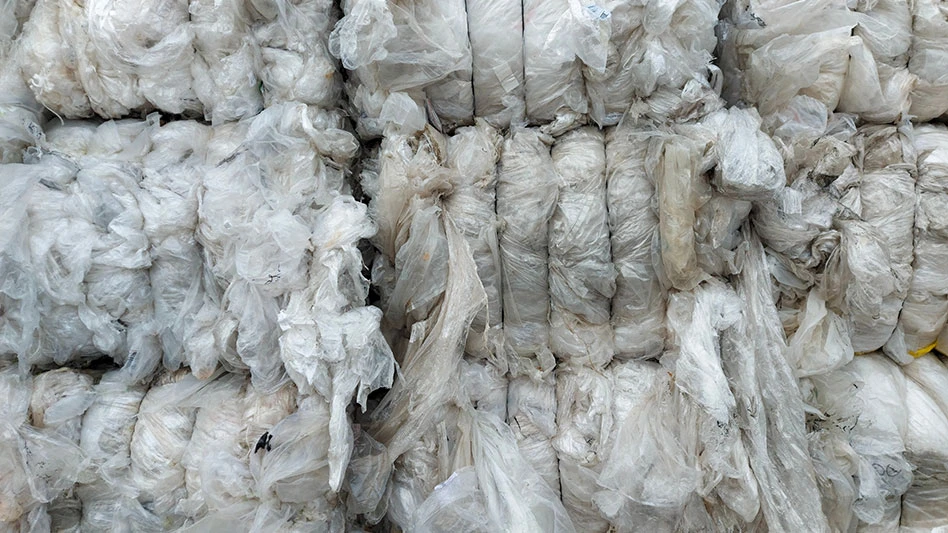In the computer world, speed and power are everything. And gains on those attributes continue to grow as new products head to the market. And with each technological advance comes another piece of equipment that no longer has a use-creating a mounting problem for solid waste managers.
And thus comes the argument of who is responsible for these heaps of circuit boards, monitors and other materials, some of which are toxic and not welcome at landfills. With many municipal electronics collection programs losing money, or at best breaking even, no one wants to claim financial responsibility for what may soon become everyone’s problem.
The National Recycling Coalition (NRC), Alexandria, Va., estimates 500 million PCs will be obsolete by 2007. About 200 million computers were taken out of action in 1998 alone. Of those units, about 10% were recycled. While there are 400 or more electronics recyclers in the U.S., matching up machines with the appropriate recyclers can be quite a challenge. And convincing consumers to pay to have their old machine recycled is another challenge.
In response to this growing number of outdated computers, several original equipment manufacturers (OEMs) have implemented programs to encourage recycling. These programs vary in structure depending on the OEM, with some having mail-back programs for units and others partnering with local waste haulers and electronics recyclers.
| Monitoring the Problem |
|
While there is no current legislation mandating the recycling of electronics, several states have adopted bans on the disposal of products such as televisions and computer monitors in landfills. Massachusetts is the first state to have implemented a statewide ban on computer screens, television sets and other glass picture tubes in landfills and incinerators. This new regulation means that neither businesses nor individuals can dispose of these materials in the trash. Six collection sites are now being set up to take these items, with cities and towns taking on the burden of transporting the materials to these sites. The items will then be refurbished or recycled. Cathode Ray Tubes (CRTs) are the focus of the new regulations. The average CRT contains five to eight pounds of lead, the substance the state is trying to keep out of the landfill with the change. Computer circuit boards also contain toxic materials as well. Colorado is following the likes of Massachusetts and Minnesota in attempting to create a solution for the growing electronics stockpiles by addressing the disposal of monitors. House Bill 1106 would create a recycling account that would be used for the disposal of cathode ray tubes (CRTs) in computer monitors and televisions. It would also pay for education and promotion of this program. Passage of the bill would most likely: Establish a CRT recycling pilot program to encourage private industry to research development of new technologies for recycling and the handing of CRTs. A fund will be created to develop public education materials Accept grants or loans from any source and deposit the money into a private account Make grants or loans available to private industry and public-private partnerships for location or expansion of research and development projects Use funds from the general fund in an amount equal to the department’s direct and indirect administrative costs for the particular program. |
From the Inside Out
Several computer manufacturers have internal computer recycling programs in place to handle portions of the obsolete leased and purchased computer stream, as well as equipment used internally and considered obsolete. Hewlett Packard Co. (HP), Roseville, Calif., had enough obsolete units within HP itself that it began a joint venture with Noranda Inc., Toronto, Ontario. In 1996, HP and Micro Metallics, a company acquired by Noranda in 1984, formed a joint venture to step up HP’s asset recovery and recycling program. The agreement prompted the construction of the Metal Separation Plant, Roseville, Calif., which is used to process HP equipment.
When HP first looked to expand the recycling of its units, it found no ready solution and decided to form the venture with Noranda. The feedstock for the facility is acquired internally from HP and some large take-back programs with customers. Units arrive, are assessed and evaluated, and the unit is stripped of usable parts. The remainder is fed to a granulator and are separated into plastics, and metals streams, says Mary Jo Rogers, public affairs officer for HP.
About 90% of what the facility processes is HP product and the company is also looking to expand that portion of their business. Rogers says she expects HP to make an announcement concerning recycling in the near future. About 3.5 million pounds of materials are processed at the Roseville plant.
Dell Computer Corp., Austin, Texas, also has a similar take-back program, aimed at its leasing customers and other large companies that may have Dell units. Dell Financial Services handles the asset recovery for customers and the viability of the units determines how they are recycled, says Laura Thomas, senior communications analyst.
“The company is targeting the larger portion of PCs out there,” she says. Customers are provided documentation about the recycling of their computers as well, Thomas notes.
A Small Problem Grows
Electronics recycling by OEMs can trace its roots to an internal program for Sony Electronics Inc., headquartered in New York City, in the early 1990s, and has grown to include post-consumer materials as well. At that time, the company was trying to deal with electronics products found to be defective during the manufacturing process, says Mark Small, vice president of Environmental Safety and Health.
“We make three million picture tubes a year,” the San Diego-based Small says, “and even if you look at a 1% defective rate that would leave us with 30,000 pieces that do not meet our quality standards. Our initial focus was, how do we deal with that material.”
In response to that need, Small says Sony developed relationships with electronics recyclers to take the materials. And once the handling of materials from the manufacturing of equipment was in place, Small says Sony then moved on to tackling post-consumer material, which proved to be harder than handling its own units. “This first phase was pretty easy, we knew what was in it and there wasn’t a variety of products.”
“The recycling business is not one we want to be in,” Small says. “We did realize early on that high tech companies are not good at recycling. We tend to over-engineer things and recycling is labor intensive. We were dealing with something with a pretty low value as well.”
Small says Sony realized early on they were not equipped to handle the actual product recycling, and other companies had tried to venture into that niche and had failed. Instead, Sony decided to rely on the already existing recycling infrastructure to handle post-consumer products. “We developed a lot of things with the recyclers and our goal is not to make a profit, but to develop recycling.”
| Bridging the Gaps |
|
The fragmented structure of the electronics recycling industry has prompted Massachusetts to devote money and personnel to launch the Product Stewardship Institute at the University of Massachusetts, Lowell, Mass. The state has devoted $150,000 to the institute and about 100 government officials met to discuss strategies for voluntary agreements with manufactures of electronics and products containing mercury, paint, carpet and pesticides. These materials were chosen because of their high toxicity levels. Created in December 2000, the Product Stewardship Institute is a voluntary group hoping to facilitate dialog, says institute director Scott Cassel. "It is a national organization that is set up to develop voluntary, negotiated agreements with the industry to reduce the health and environmental impacts from consumer products. The institute is coordinating with state and local governments from around the county and other stakeholders." Cassel says the institute is a way to bring the parties dealing with electronics disposal together and to try to get something done. "It’s a way to coordinate the state and local interests and to bring the concerns of the state and local government to industry ... and to ask them to sit down and discuss some of the waste management problems that are created by their products." He says that in no way is the institute meant to put manufacturers on the defensive. "It’s not intended to be adversarial, and instead is intended to develop some voluntary negotiated agreements that would be in lieu of regulatory action. These agencies do have the ability and even the interest in moving forward with command and control approaches. But it is an opportunity to enter into agreements which will work for all stakeholders and still have the flexibility and innovation that often comes out side of the regulatory process." Some of the main goals of the group are to develop principals on product stewardship and to set a basic understanding for what that is. The other goal is to set a national electronics product stewardship initiative, he says. That is already underway. "That is definitely the top issue and because of that the institute was asked to coordinate state and local governments around the country and is working with the center for Clean Products and Clean Technologies at the University of Tennessee to coordinate larger stakeholder meetings. They will more formally invite the industry to participate in the dialog and hope something can take place in the next few months." One of the main reasons a national group was started was to prevent there being a different structure and organization in each state and therefore making it more difficult to recycle electronics because of varying state regulations and rules, Cassel says. "One of the reasons for doing this nationally is for greater efficiency and effectiveness. No industry wants to see 50 states with 50 different regulatory frameworks for electronics, or any other product." |
Partnering for a Solution
The task then became finding an economical way of facilitating electronics recycling on a mass scale. A partnership was formed between Sony Electronics Inc.; The Minnesota Office of Environmental Assistance, St. Paul, Minn.; Waste Management Inc. (WM), Houston; Panasonic-Matsushita and the American Plastics Council (APC) for a three month pilot program. The program collected about 600 tons of used Sony brand electronics at three sites owned by WM.
“Our goal with the Minnesota project was to use the existing infrastructure to get our program going and then have the manufacturers focus on what we do best,” Small says. “What we can contribute is to design the material so that there is more recycling and more recyclable components. Out goal over the next five years is to have a more sustainable recycling industry.”
He says for every pound of electronics equipment recycled by Sony, it costs the company about eight cents. “What Sony is doing now, in Minnesota, and what we plan to do in all 50 states, is subsidize the cost.”
Currently the Sony-Minnesota project is only for Sony products, and is free for consumers. The area was a natural place to begin the pilot for the program because household curbside collection programs were already in place. Small says Sony’s goal is to have eight more states with programs like the Sony-Minnesota project in place by the end of the year. “We are pretty confident we will hit that and what we need to do is get other manufacturers involved.”
Small says Sony realizes the stakes are high for the success of this program. If OEMs can not make a go of programs like theirs, the government could step in, which could result in added taxes. “Again, it will fall back into the consumer’s lap. If this material has value and if people want this, the collection rate can go up. A lot of things for the environment make business sense,” he says. The responsibility for electronics recycling could be a shared responsibility between retailers, government and the consumer, he says.
Taking Charge
While the U.S. is still trying to determine the most efficient way to collect used consumer electronics, legislation in Europe will mandate mandatory product-take back by OEMs, says Lauren Roman, president of Industrial Recycling Services, Flanders, N.J. Directives proposed and approved by the European Union (EU) set new standards for sales of electronics equipment in Europe, even if manufactured in the U.S. or Asia.
One directive originally called the Waste From Electrical and Electronic Equipment (WEEE) requires companies to recycle their computers and IT equipment when it reaches its useful life. The second phase of the directive would phase out the use of lead and other harmful substances that are exported to Europe. The compliance deadline would be 2008.
U.S. manufacturers export about $6 billion worth of consumer electronics to Europe each year and would be greatly affected by this change. Currently, Roman says, manufacturers, disposal companies and EU officials are trying to determine how they will abide by this new ruling. Some of the debate lies in a proposed mandatory fee included in the purchase price to pay for recycling. But, Roman says, the problem then becomes what if one company can manufacture a unit that costs $5 to demanufacture but the mandatory fee is $10? Manufacturers are arguing if they can make a product that costs less to demanufacture, then they should be rewarded by being able to offer their customers a discounted fee.
Overall, U.S. companies seem slower to respond to the electronics recycling issue in general than those in Europe. “The best advice I can give to the OEM,” Roman says, “is to do it [electronics recycling] before you have to do it so you can make the decisions as to how it is going to work for your company.”
Consumers are becoming more aware of the dangers of trashing computers, though, and she fields a fair amount of calls asking where to take computers and monitors. Roman says she refers them to the local county household waste coordinator, but handing these components over to that department comes at a cost for the county and the tax payer.
She says the most effective way to get electronics recycled would be to include an end-of-life handling fee into the cost of the original unit. Outsourcing is another key to success she says. “I think many companies realized early on that they don’t want to be in this [the recycling] business and what they should be doing is outsourcing,” Roman says. The shear volume of machines estimated to be heading for disposal has made some OEMs nervous as to how they would handle such a high quantity. Having a good relationship with several electronics recyclers would still not be enough to handle millions of units. “I think the only solution for the manufacturers is to start making alliances with the best demanufacturing companies and have them do the demanufacturing work.”
| Toxic Trash |
|
Certain components of computers and other electronics equipment can contain chemicals and substances that are hazardous for the environment. In several areas, the disposal of monitors, which contain harmful Cathode Ray Tubes (CRTs), and other components such as batteries are banned from landfills. Some of these components include: Computer monitors and televisions, both of which contain CRTs and lead; Printed circuit boards that contain metals such as lead, chromium, cadmium and mercury, a material already banned from disposal in some states. Batteries in electronics can also contain lead, mercury and cadmium Mercury-containing components are often found in electronics. PCBs may be found in televisions and computers made before the early 1980s. The Minnesota Office of Environmental Assistance has several suggestions to reduce the amount of electronics waste to be disposed: Lease equipment and return older units to the vendor when upgrades are desired. Avoid techno-gadgets that may be more costly, may wear out faster and may not be much of an improvement compared to other options. Identify durable products and research durability and consumer reliability ratings before making a purchase. Repair products instead of replacing them, which could also be less expensive than purchasing a new product. Purchasing products that can be upgraded in the future will reduce the amount thrown away and prevent the need to buy a whole new product. |
A REALISTIC LOOK
One electronics recycler says he has a rather skeptical view of the recycling programs many computer manufacturers are putting into place. J.D. Porter, owner of Computer Reuse & Recycling, Austin, Texas, says the segmentation of take-back programs does not help the situation, and for any program to be a success, manufacturers are going to have to partner with the competition. “The problem with individual companies doing it on an individual basis is that it doesn’t really address the problem,” he says. “If you are only going to take back a specific brand, then you put a restriction on the pipeline from the infeed scale. It may just take them going through these individual efforts, and once they get through that they may come together.”
Porter acknowledges his skepticism may be from many failed attempts at penning deals with major OEMs to take back products for recycling. “We have tried and we have had numerous efforts to try to get them [OEMs] to work together and to partner up, and they will not work together,” he says.
But, those who wait to implement programs will be the ones hurt in the long run, Porter says. It is a matter of time before possible mandatory legislation hits, and if companies are forced to come up with a solution in a bind, that will hurt them more than if they deal with the problem now. “It is something that will happen, that is not a question.” RT
The author is associate editor of Recycling Today and can be reached via e-mail at mgoodrich@recyclingtoday.com.
| Electronics Recyclers |
|
Each listing has been compiled from existing lists and research. While an effort has been made to verify the accuracy of this information, there is no guarantee, expressed or implied, that the listed information is exact. Inclusion in this list does not imply an endorsement by Recycling Today. If you would like to make changes too or be added to this list, please e-mail Melissa Goodrich, Associate Editor, Recycling Today, at mgoodrich@recyclingtoday.com 5R Processors Catawba, Wisc. Aarwin Inc. Elmira, N.Y. aarwin@aol.com A&B Recycling Inc. Fort Oglethorpe, Ga. abrecy@aol.com Absolute Recycling West Haven, Conn. Action Computing Solutions Centreville, Va. Accu-Shred Limited Mississaugua, Ontario ACT Computer Technology Inc. Austin, Texas Adherent Technologies Inc. Albuquerque, N.M. 102546.1234@compuserve.com ADS Metals Bellevue, Wash. (Metals) Advanced Recovery Inc. Belleville, N.J. Advanced Recovery Oradell, N.J. Advanced Technological Solutions Inc. Brooklyn, N.Y. AERC Flanders, N.J. jgresk@aol.com Affordable Business Technologies Inc. Alexandria, Va. Alco Refiners Wheatley Heights, N.Y. Aleph Electronics San Leandro, Calif. Allied Computer Brokers Haverhill, Mass. scalese@acbrecovery.com Allied Electronic Recovery Union City, Calf. andre@aerxchange.com Alimar Technology Corp. Portsmouth, N.H. steph@alimartech.com Allon Computer Norwalk, Conn. Alta Resource Management Service Springfield, Mass. All Tech Computer Recyclers Torrance, Calif. AllTeck@aol.com Altech-Houston Houston, Texas America II ELEctronics Inc. St. Petersburg, Fla. bgruber@aiie.americaii.com American Recycling Co. Cleveland, Ohio Amion Metals New York, N.Y. amion@aol.com Another BytE Flagstaff, Ariz. abyte@infomagic.com Asian Export Boston, Mass. A Shapiro & Sons North Adams, Mass. Asset Management Consultants inc. Austin, Texas miowe@itrade-s.com Asset Recovery St. Paul, Minn. AT & T Materials Reclamation Center West Chicago, Ill. Aurora Electronics Inc. Irvine, Calif. Automation Resource Information Center (EIPP) Arlington, Va. B & D Electronics Salvage San Jose, Calif. Back Thru The Future Micro Computers Inc. Norcross, Ga. BackThruTheFuture.com Baker Street Resources Atlanta, Ga. Cliff.bakerstreet@home.com Bayview Computer Recycling Center San Francisco, Calif. Bloominton Lakeville Appliance Lakeville, Minn. BMEx Beloit, Wisc. Boston Computer Exchange Boston, Mass. msa@bcs.org Capital PC Users Rockville, Md. CEC Enterprises North Chelmsford, Mass. Cerplex San Diego, Calif. Chero Resources LLC Ne York, N.Y. 102152.1344@compuserve.com Children’s Choice Inc. Staunton, Va. City Industries Inc. Dallas, Texas fljr@airmail.net CMI/Compucycle Houston, Texas Cmi1@flash.net Colt Refining Inc. East Haven, Conn. Community Resource Center Cincinnati, Ohio Compaq Factory Outlet Houston, Texas Complex Metals Houston, Texas COMPRENEW Corp. Columbus, Ohio info@comprenew.com COMPRENEW Corp. Belmont, Mich. info@comprenew.com Computer Depot Columbia, Mo. knoel@interactcorp.com Computer Drive Connection Banks, Ore. Computer Equipment Resources Carnation, Wash. (Computers/Components) Computer Exchange USA coexusa@nwlink.com Kirkland, Wash. (Computers/Components) Computer Exchange Williston, Vt. Computers for Africa Project New York, N.Y. Computer Place London, Ky. Computers Plus South Burlington, Vt. Computer Reclamation Inc. Silver Spring, Md. chapman@tnt.org Computer Recyclers Elmhurst, Ill. Computer Recyclers St. Louis Park, Minn. Computer Recycling Rancocas, N.J. cranmer@voicentet.com Computer Recycling Center Santa Clara, Calif. markh@crc.org Computer Recycling Center Carnegie Mellon University Pittsburgh, Pa. retread@andrew.cmu.edu Computer Recycling Consortium Cleveland, Ohio Computer Recycling for Education and Community Enhancement San Antonio, Texas mrhodes@salsa.net Computer Recycling & Refining Branford, Conn. Computer Recycling Solutions Berwyn, Ill. Computer Renaissance Schaumburg, Ill. Computer Renaissance Eden Prairie, Minn. Computer Renaissance Alexandria, Va. Computer Re-Use Network (CoRN) Hollywood, S.C. Computer Reuse and Recycling Austin, Texas jdporter@tpoint.net Computer Services Inc. Philadelphia, Pa. Computer Solutions and Electronics Raymond, N.H. sales@csande.com Conigliaro Industries Framingham, Mass. Conway Metals Whitman, Mass. Crecer San Antonio, Texas dduester@smart1.net CRT Recycling Inc. 508/230-8090 CTBI Co. San Antonio, Texas D & B Precious Metals Chicago, Ill. Dale Wein Communications Cleveland, Ohio Weincellar@aol.com Dallas Computer Literacy Program Dallas, Texas Dayton Microcomputer Association Dayton, Ohio Dell Factory Outlet Round Rock, Texas Dexis Corp. Eden Prairie, Minn. Digital Computer Asset Recovery Service Shrewsbury, Mass. DMC Hagerstown, Md. Info@dmcrecycling.com DMCRecycling.com DMC Newfields, N.H. dmerc@tiac.net Dove Data Products Florence, S.C. DRAGnet-RE PC Minneapolis, Minn. Drapper/Lennon Inc. Concord, N.H. Earth protection Services Inc. Nashville, Tenn. ECO-Cycle Boulder, Colo. Ecoplast/Western Gold Thermoplastics Los Angeles, Calif. Ecosource Corp. Chino, Calif. ECS Greensboro, N.C. Sburns4744@aol.com ECS Dallas Dallas, Texas jkline@ecsrefining.com ECS Refining Santa Clara, Calif. jtaggart@ecsrefining.com EDR Manchester, N.H. Electronica Peacedale, R.I. Electrochemicals Inc. Maple Plain, Minn. ElectroniCycle Inc. Spencer, Mass. dick@electronicycle.com Electronic Materials and Recovery Phoenix, Ariz. Electronic Recovery Specialists Chicago, Ill. Electronic Recovery Inc. Minneapolis, Minn. Electronic Orphanage Bow, N.H. Electronic Recovery Inc. Maple Plain, Minn. Electronic Resource Recovery Newburgh, N.Y. Electronics Processing Association Inc. Lowell, Mass. Electronic Recovery Specialist Inc. Niles, Ill. ersgold@aol.com Electronics Recyclers Shrewsbury, Mass. recyclers@wn.net Enviro-Chem Rogers, Minn. EnviroCycle Inc. High Point, N.C. EnviroCycle Inc. Hallstead, Pa. gvoorhees@matcogroup.com EnviroLight and Disposal Inc. Tampa, Fla. Equipment Recycling Services Roseville, Calif. (computers/Components) Equipment Serviceds Bethlehem. Pa. Farmstead Asset Management Services LLC Piscataway, N.J. aangerjr@worldnet.att.net Fox Electronics Inc. San Jose, Calif. FoxElectronics.com Fox Integrated Technologies Inc. San Jose, Calif. Franklin Smelting & Refining Philadelphia, Pa. Free Bytes NP Inc. Atlanta, Ga. freebytes@mindspring.com Fry’s Electronics San Jose, Calif. Gala Strategies Brooklyn, N.Y. Gianco Ltd. West Babylon, N.Y. Gifts in Kind International Alexandria, Va. dbryant@giftsinkind.org Global Recycling Technologies Inc. Stoughton, Mass. Gold Refiners NW Mercer Island, Wash. (Metals) Goldsmith Group Indianapolis, Ind. Goldstein Worcester, Mass. Goodwill Computer Recycling Center Pittsburgh, Pa. john@goodwillpitt.org Goodwill Industries of St. Paul St. Paul, Minn. Gopher Smelting and Refining Co. Eagan, Minn. Great Lakes Electronic Recycling Detroit, Mich. gler@bignet.net Green Disk Software Recycling Preston, Wash. (Computer Disks/Magnetic Media) Green Guardian Tempe, Ariz. Guaranteed Plastics Inc. Gloucester, N.J. jack@scrapplastic.com Hallmark Refining Group Mt. Vernon, Wash. tim@hallmarkrefining.com (Metals) Hamos, USA/LAA Ltd. Philadelphia, Pa. Hamos USA Asheville, N.C. hamosusa@mindspring.net Handy and Harman Yorba Linda, Calif. (Metals) Handy & Harmon Refining Group Inc. South Windsor, Conn. John.bullock@handy.com Handy & Harmon Refining Group Inc. Lincoln, R.I. pjaustin@aol.com Hess Technologies Sayerville, N.J. David.zimet@hesstech.com Hewlett-Packard Santa Clara, Calif. Hewlett-Packard/Alternate Sourcing Group Roseville, Calif. HMR San Francisco, Calif. HOBI International Inc. West Chicago, Ill. Chill@hobi.com HOBI International Inc. Dallas, Texas cboswell@hobi.com Homer Treloar HLPServ@aol.com Renton, Wash. (Computers/Components) Houston Area League of PC Users Houston, Texas garden@hai-pc.org H & R Scrap Metals Inc. Milwaukee, Wisc. Hudson Valley Materials Exchange New Paltz, N.Y. Huron County Solid Waste Facility Willard, Ohio ICC Net Grand Junction, Colo. ICS Plastics Inc. Amherst, N.Y. Industrial Materials Exchange Service Springfield, Ill. Industrial Recycling Services Inc. Flanders, N.J. Lsroman@industrialrecycling.com Inter Recycling Inc. Conroe, Texas Innovative Recycling Corp. Albuquerque, N.M. Interhelp Alexandria, Va. pcrecycle@interhelp.com Japan Technical Information Center Arlington, Va. Jericho Road/Cooperative Computer Ministry Memphis, Tenn. Joy Recovery Aurora, Ill. Kaska Corp. Inc. East Brunswick, N.J. USAKosca@pluto.skyweb.net La Casa de Don Pedro Inc. Newark, N.J. Edison@lacasa-tic.org Lakewood Electric Co. Howell, N.J. L & M Technical Recycling Co. Akron, Ohio LibertyNet Philadelphia, Pa. Long Island Arts Council at Freeport Freeport, N.Y. Long Island City Bus. Dev. Corp (INWRAP) Long Island City, N.Y. inwrap@hotmail.com Louis J. Horman Metals Cincinnati, Ohio MARC5R Processors Inc. Lithonia, Ga. MARC5R.com Maine Scrap Metals Inc. Des Plaines, Ill. Marin Computer Resource Center San Rafael, Calif. mcrc@pacbell.net Martin Metals Inc. Los Angeles, Calif. (Metals) Massachusetts Department of Environmental Protection Boston, mass. Robin.ingenthron@state.ma.us Materials Processing Corp. Eagan, Minn. Max Phillips and Son Inc. Eau Claire, Wisc. MBA Polymers Berkeley, Calif. MBAP1MB@aol.com Mercury Refining Co. Albany, N.Y. dbcohen@aol.com Metaltech Laboratories Laconia, N.H. Metech International Inc. Gilroy, Calif. Metech International Inc. Mapleville, R.I. bsiler@metech-arm.com Metals Reclamation Services San Jose, Calif. mrsgjhill@aol.com Micro Metallics Corp. San Jose, Calif. Skurnacs@micrometallicscorp.com MicroMetallicsCorp.com Mid City Scrap Iron Westport, Mass. Midwest Compute Exchange Falcon Heights, Minn. Mindsgare Collaborative Brighton, Mass. Minnesota Technical Assistance Program Minneapolis, Minn. MKR Data Resources Naushua, N.H. Motor City Computer Pontiac, Mish. kstolicker@motorcitycomputer.com Music Computer Recycling Program Lorain, Ohio Nacomex USA Inc. Tivoli, N.Y. National Computer Witchita, Kan. natcom@natcom.com National IC Recovery St. Petersburg, Fla. National Surplus Exchange Program Norwood, Mo. Nesar Systems Darlington, Pa. NETI Initiative Sherman Oaks, Calif. Newtech Recycling Inc. Bridgewater, N.J. Newtech Recycling Inc. Rahway, N.J. Newteen Recycling Inc. Roselle, N.J. New Yrok MacUsers Group New York, New York NICR San Clemete, Calif. Nonprofit Computer Connection Boston, Mass. tdc@igc.apc.org Non-Profit Computing Inc. New York, New York German63@hotmail.com Noranda Mettalurgy Toronto, Ontario Noranda Inc. E. Providence, R.I. cianiaj@sampling.noranda.com North America Micro Corp. Denmark, Wisc. North Coast Computer Recycling Euclid, Ohio OrbitalRes@aol.com Northern Telecom Material Reclamation Durham, N.C. Northwest Micro Beaverton, Ore. Oak Ridge National Recycle Center (TORNRC) Oak Ridge, Tenn. Athena@oakridgerecycle.com Oliver Trading Inc. Lexington, S.C. oliver@conterra.com Oxford Metals Inc. Chicago, Ill. Oakland Technology Exchange Oakland, Calif. Oregon Public Networking Eugene, Ore. helpdesk@efn.com Oxford Metals Inc. Chicago, Ill Pacific Iron & Metal Seattle, Wash. (Metals) Pacific Northwest Recycle Seattle, Wash. (Metals) Paterson Education Fund Paterson, N.J. lpabon@patersoneducation.org Performance Reclamation Tipp City, Ohio Peripheral Manufacturing Inc. Denver, Colo. Periphman@eazy.com (Computer Disks/Magnetic Media) Peripherals Costa Mesa, Calif. Philadelphia Area Computer Society Philadelphia, Pa. Philip Environmental (Services?) Pittsburgh, Pa. Philip Services Pittsburgh, Pa. jyoung@philipinc.com PHL International Corp. Sturtevant, Wisc. Practical Computer Inc. Springfield, Va. Proactive Environmental R&D Marietta, Ga. Proactive Environmental R & D Inc. Houston, Texas Product Takeback Services Bedford, Mass. Public Service Electric & Gas Co. Gibbstown, N.J. Albert.fralinger@pseg.com Q Technology Woodinville, Wash. (Computer Disks/Magnetic Media) Quantum Resource Recovery Beaverton, Ore. quantumresource@bigplanet.com R2 Reuse Centers Inc. Countryside, Ill. Rentex Inc. Boston, Mass. RE-PC repc@dycom.net Tukwila, Wash. (Computers/Components) RECYCLIGHTS Inc. Bloomington, Minn. Recycle North Burlington, Vt. Recycletown Rio Nido, Calif ReCycle North Burlington, Vt. RecycledPCparts.com Miami, Fla. Resources for Environmental Management Acton, Mass. R. Fraiser U.S. Inc. Salem, Va. R. Frazier U.S. Inc. Austin, Texas jzeigler@rfrazierus.com Resource Concepts Inc. Carrollton, Texas ahs@resourcecon.com Resource Concepts Enviro Inc. Dallas, Texas Resource Solutions Corp. Madison, Wisc. Restore-Winnipeg Winnipeg, Manitoba ReUsed Goods Freport, N.Y. ReUse Industries Albany, Ohio reuse@eurekanet.com Ribbon Recyclers Williston, Vt. Riverside Salvage and Metal Co. Seattle, Wash. (Metals) Robin Hood Foundation New York, New York Rochester Computer Recycling & Recovery Rochester, N.Y. charliem@rochestercomputer.com Rockaway Recycling Rockaway, N.J. RST Computer Services Hudson, N.H. RST Reclaiming Co. Inc. Lowell, Mass. Ruby Computer Recovery Colton, Calif. Rumasian Technologies Inc. Kenilworth, N.J. Rustec Inc. Camden, N.J. Second Chance Program Fairfax, Va. Secure Environmental Electronic Recycling Tampa, Fla. SGS Computer Corp. Cleveland, Ohio Scientific Recycling Holmen, Wisc. SCROUNGE University Park, Pa. Scrounge9@psuvm.psu.edu Seattle Computer Exchange Bellevue, Wash. cer@connectexpress.com (Computers/Components) Severson Scrap Metals Inc. Madison, Wisc. Silicon Salvage Anaheim, Calif. The Silver Group Belvidere, Ill. SIPI Metals Corp. Chicago, Ill. Southeastern Computer Recycling Corp. SECRC.com Milledgeville, Ga. Southwest Public Recycling Association Tuscon, Ariz. Space Fitters Inc. South Windsor, Conn. slaterj@spacefitters.com Spring Lake Equipment Eden Prairie, Minn. Stateline Recycling Inc. Jamesville, Wisc. STRUT (Student Recycling Used Technology) Hillsboro, Ore. Surplus Exchange Kansas City, Mo. Tacoma Metals Inc. Tacoma, Wash. (Metals) Talco Plastics Whittier, Calif. Target Development Westport, Mass. Techneglas Inc. Columbus, Ohio lowry@techneglas.com Tecneglas Inc. Pittston, Pa. Technology Investment Recovery Inc. New York, N.Y. Technology Recycling Inc. Palm Bay, Fla. trkd@worldnet.att. Tecnotes Sag Harbor, N.Y. sales@tecnotes.com Tecnotes Westhampton Beach, N.Y. sales@tecnotes.com Teledyne Brown Engineering Oak Ridge, Tenn. teledyneor@icx.net Texas Metal Recyclers Houston, Texas Texas Recycling & Refining Inc. Houston, Texas Tombarello Recycling Lawrence, Mass. Total Reclaim Inc. Seattle, Wash. TradeUps Inc. TradeUps.com Atlanta, Ga. TRI Recycling Inc. Austin, Texas Tryonics Inc. Hampton, N.H. U.S. Mirco Corp. USMicroCorp.com Smyrna, Ga. United Datatech San Jose, Calif. kevink@uniteddatatech.com UnitedDataTech.com United Recycling Industries Inc. Franklin Park, Ill. dstoecklin@aol.com United Recycling Industries Inc. Franklin Park, Ill rglavin@msn.com Universal Integrated Circuits Inc. Carol Stream, Ill. University of Massachusetts Intermediate Processing Facility Amherst, Mass. USA Flex Bloomingdale, Ill. VADICO LLC Round Rock, Texas info@vadico.com Vermont Retroworks Middlebury, Vt. retroworks@mail.com Vetco Electronics Vetco@dycom.net Bellevue, Wash. (Computers/Components) Video Display Corp. VideoDisplay.com Stone Mountain, Ga. Vision Computer Remarketers Woburn, Mass. VP Electronics Inc. San Jose, Calif. VP_Electronics@email.msn.com Wade Environmental Industries Atco, N.J. wadeenviro@aol.com Warner Computer Recycling Duluth, Ga. Waste Management Amsterdam, N.Y. Peter_Bennison@wmx.com Waste Not Recycling Herndon, Va. WA Technology Salem, N.H. Waste Management of Arizona, Asset Recovery Group Phoenix, Ariz. Westech Recyclers Phoenix, Ariz. earl@westechrecyclers. West Pacific Industries Commerce, Calif. West Pacific Industries Houston, Texas Wilsonart International Temple, Texas Windfield Alloy Lawrence, Mass. Women’s Environment and Development Organization (WEDO) New York, N.Y. wedo@igc.apc.org Wyse’s Technology San Jose, Calif. Zentech Zentech.com Atlanta, Ga. Zeos-Division of Micron St. Paul, Minn. |

Explore the April 2001 Issue
Check out more from this issue and find your next story to read.
Latest from Recycling Today
- You have production scrap, WEIMA machinery processes it where it’s made
- CP Group, Cisek Inspections forge innovative X‑ray recycling alliance
- Regroup, CP Group unite for cutting-edge Halifax MRF
- Modern MRFs: AI, automation and safety, redefining recycling operations
- CalRecycle opens comment period on proposed SB 54 revisions
- 2026 Circular Steel Summit: Taking stock of tariffs
- CDRA Conference & Tradeshow 2026: Addressing battery fire risks
- Darda equipment now available in North America





